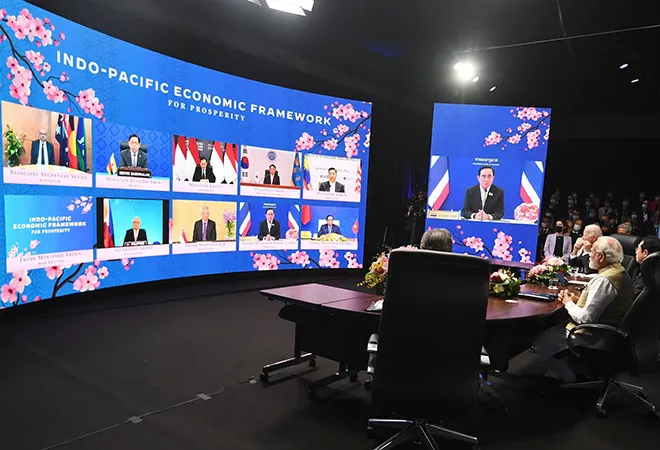After 16 months in office, the Biden Administration has finally pulled back the curtain on its signature economic initiative: the Indo-Pacific Economic Framework. However, as grand reveals go, the IPEF has been more than a little underwhelming.
The new framework, which the United States has made clear is not a free trade agreement, brings thirteen countries together to shape rules on key focus areas like the digital economy, trusted supply chains, clean economic growth, corporate accountability and anti-corruption. The Biden Administration has also laid regional anxieties to rest by inviting India, Thailand and the Philippines. In doing so, America has ensured that the IPEF will not be reduced to a talk shop that only brings together America’s old friends and allies to discuss regional economic priorities. For the Biden Administration, the IPEF represents an opportunity to correct America’s military-driven approach to the region by talking to Indo-Pacific nations about economic growth and trade. Setting standards on labour, digital trade and technology and boosting its economic ties with the region will help secure America’s slipping foothold in the region against China’s ascendancy.
For the Biden Administration, the IPEF represents an opportunity to correct America’s military-driven approach to the region by talking to Indo-Pacific nations about economic growth and trade.
However, the existing framework is disappointingly thin on the details. The statement released by the White House, which follows on the heels of a short press release in October 2021, offers little by way of additional details. This would give credence to the view held by many in Washington and in regional capitals that the Biden Administration has struggled to put meat on the bones of the IPEF. It is no secret that the incumbent Administration has been paralysed by a pitched internal battle between pro-trade elements and the progressive wing of the Democratic Party. All this has meant that, after 16 months of Biden taking office, America’s economic policy in Asia remains ill-defined.
The details that we do have are also less than encouraging. Firstly, America seems to offer little by way of market access and economic incentives to the other powers in the IPEF. To a number of countries, the IPEF is a laundry list of American demands on everything ranging from environmental and labour protection to digital standards. While trade concessions and market access agreements might incentivise nations to accept American standards, US Trade Representative Katherine Tai argued that such incentives were a feature of “traditional” trade agreements without clarifying how the IPEF would prove any different. Given that America’s Congress, which must approve trade concessions, will not be voting on the IPEF, it would seem that the Biden Administration has no real plans to give ground.
This puts the IPEF in an unenviable position. Should America fail to put together a convincing package of incentives, many nations may prefer to make looser and less consequential commitments rather than undertake difficult and costly processes like supply chain decarbonization. This would mean that Washington will be left talking to the usual suspects - advanced economies like Japan, South Korea, Australia and Singapore - without making any real breakthroughs in new markets.
The IPEF may also be a victim of poor timing. With negotiations set to kickstart over the next few weeks after months of lost time, it seems unlikely that major progress will be made before the US midterm elections slated for November. With inflation rampant and Biden’s approval rating determined to hit new lows, every negotiating country will wonder about the American President’s ability to deliver on the promises his country will make at the negotiating table. Observers of international trade will remember that the Obama Administration’s foot dragging over the highly ambitious Trans Pacific Partnership condemned the promising trade accord. Should another highly vaunted American trade initiative fail, it would deal a significant blow to Washington’s already bruised reputation for economic leadership in Asia.
With inflation rampant and Biden’s approval rating determined to hit new lows, every negotiating country will wonder about the American President’s ability to deliver on the promises his country will make at the negotiating table.
For India, IPEF may still prove a good opportunity. Given New Delhi’s reluctance to join the Regional Comprehensive Economic Agreement (RCEP) or the CPTPP, signing on to the IPEF allows India another viable opportunity to shape the economic rules of the game in the region. Further, New Delhi shares America’s interest in assembling an economic coalition that can secure economic growth, fight climate change and reorder supply chains while keeping an eye on Chinese moves in the Indo-Pacific. Beijing’s incandescent reaction to the IPEF signals that China keenly appreciates the scale of the economic challenge that Washington, New Delhi and other aligned powers are likely to pose.
However, India is likely to face a series of difficult negotiations over its well-established disagreements with developed economies on the issue of data flows and localisation. New Delhi will also be worried by the aforementioned problems of durability and incentives. Should the IPEF falter, India will lose a key economic forum to make its positions known and to rally other nations to its cause.
This commentary originally appeared in Economic Times.
The views expressed above belong to the author(s). ORF research and analyses now available on Telegram! Click here to access our curated content — blogs, longforms and interviews.




 PREV
PREV



